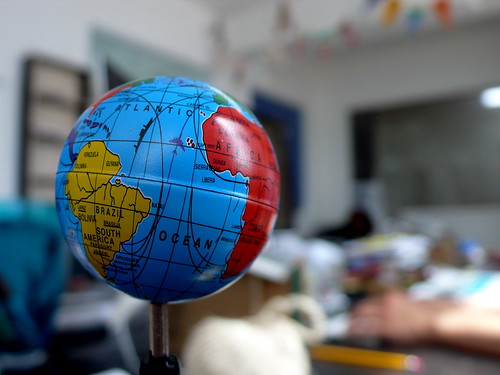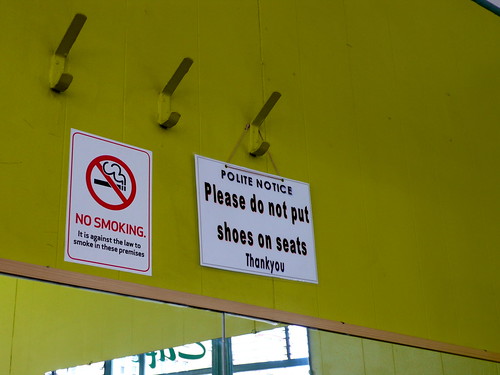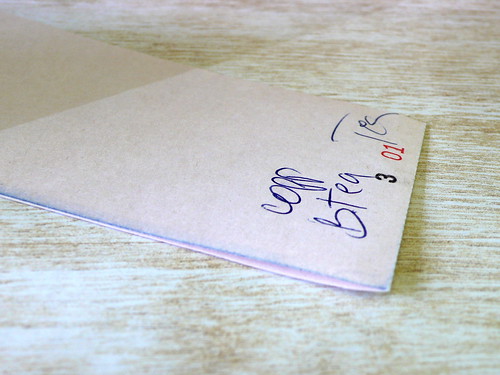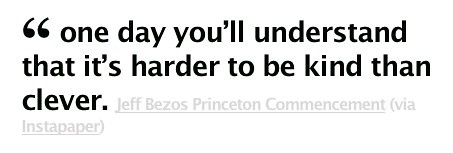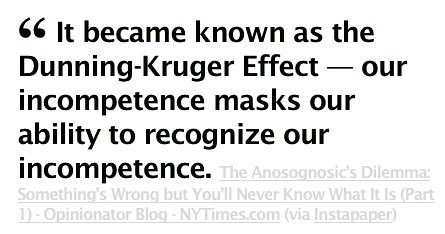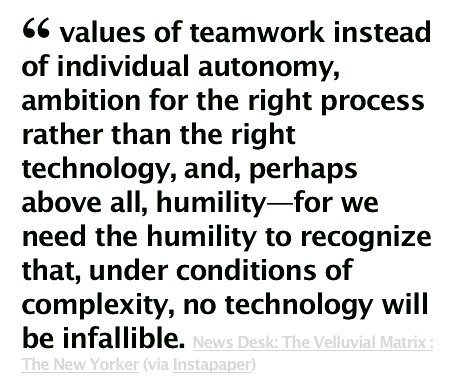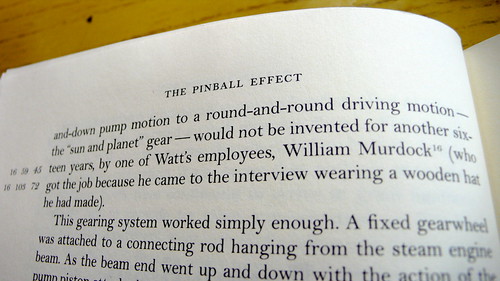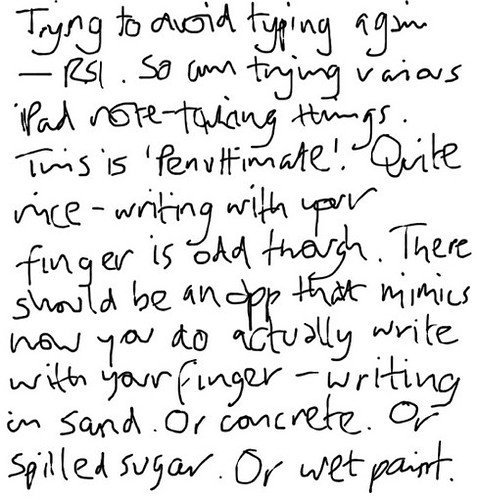It must be tricky being an author with a book to promote these days. You do all the rounds, grateful for every chance to plug your book but conscious that the people who read your interview in the WSJ are also likely to watch your interview on Newsnight and on MSN and your conversation with Borders or whatever. You're aiming at different audiences each time, but your True Fans will see you every time, alerted by the drip of RSS or the burp of twitter. And, obviously, you run the risk of repeating yourself.
Which was why I was really impressed with Clay Shirky's efforts this time around promoting Cognitive Surplus. He ended up talking in a lot of places, to a lot of people, and I ended up instapapering and reading a lot of these interviews. But I never got the sense of hearing too much of the same stuff, indeed he almost seemed to be saving up some nuggets for each occasion. I bookmarked new thoughts from many of those interviews.
I think that's a sign of a particular kind of writer/thinker - someone who's immersed in a field or area of thought and has taken time to put a sample of it in a book. It means by the time they get round to talking about it, new stuff has occurred to them, and they can genuinely reflect on the questions they've been given and come up with interesting answers. Versus the kind of writer who's just managed to get enough stuff together to fill the book and has only got that material to repeat.
This is the stuff I bookmarked from Mr Shirky's interviews. All of which just fell into my lap via RSS or twitter, so I'm sure if you go looking there'll be much more out there:
“What the fight seems to
me now is around cultural expectations of ourselves,” he told me. “It’s
actually about changing the culture we are part of in ways that take the
new medium for granted"
The Souls Of The Machine"All of a sudden in 2003-4, L.A. start-up culture got
really interesting. It was the moment where 30-year-olds said, “Wait a
minute. The people steering the ship only want to get it this much
further and then they’re willing to see it sink. I’m bailing out now."
"Ecosystems don’t do things; people do things! To be
in a room with people who care about what happens to the press and to
offload to the ecosystem the idea that things will somehow be OK is to
opt out of our cultural obligation to figure out what the “invisible
college” model is right now, that is, to sign ourselves up for a more
rigorous view of what the medium is capable of, beyond LOLcats."
"It is possible to think that the Internet will be a
net positive for society while admitting that there are significant
downsides—after all, it’s not a revolution if nobody loses."
"I think someone will make
the imprint that bypasses the traditional distribution networks. Right
now the big bottleneck is the head buyer at Barnes & Noble. That’s
the seawall holding back the flood in publishing. Someone’s going to
say, “I can do a business book or a vampire book or a romance novel,
whatever, that might sell 60% of the units it would sell if I had full
distribution and a multimillion dollar marketing campaign—but I can do
it for 1% percent of the cost.” It has already happened a couple of
times with specialty books. The moment of tip happens when enough things
get joined up to create their own feedback loop, and the feedback loop
in publishing changes when someone at Barnes & Noble says: “We can’t
afford not to stock this particular book or series from an independent
publisher.” It could be on Lulu, or iUniverse, whatever. And, I feel
pretty confident saying it’s going to happen in the next five years."
Here Comes Clay Shirky
"Of course there’s a new
Luddism! There’s always a new Luddism whenever there’s change. I mean,
Luddism is specifically a demand that the people who benefited from the
old system be consulted before any technology is allowed to disrupt it."
"And so one of the problems that old people like me
suffer from is just we know too many solutions for problems that no
longer exist. And it kind of freaks us out to realize that all the
things we mastered don’t really add up to much value anymore."
"The baby boomers, when we were young, we had zero,
zero patience for the idea that people who are in their fifties in the
’70s and ’80s should somehow be shielded from cultural changes because
somehow the stuff that we were doing was upsetting them. So, now it’s
our turn and we ought to just suck it up."
"What is quite obviously happening is that the number
of things that are available for short attention are increasing. But,
so is the ability to consume complicated, long-form information."
Interview with Clay Shirky "Whenever media become more abundant, average
quality falls quickly, while new institutional models for quality arise
slowly."
"The response to distraction, then as now, was social
structure. Reading is an unnatural act; we are no more evolved to read
books than we are to use computers. Literate societies become literate
by investing extraordinary resources, every year, training children to
read. Now it’s our turn to figure out what response we need to shape our
use of digital tools."
Does The Internet Make You Smarter?
"The final thing I'd say about optimism is this. If we took the loopiest,
most moonbeam-addled Californian utopian internet bullshit, and held it
up against the most cynical, realpolitik-inflected scepticism, the
Californian bullshit would still be a better predictor of the future.
Which is to say that, if in 1994 you'd wanted to understand what our
lives would be like right now, you'd still be better off reading a
single copy of Wired
magazine published in that year than all of the sceptical literature
published ever since."
"Would the world really be better off if we were to hide from ourselves
the fact that teenagers waste a lot of time trying to either flirt with
each other or to crack each other up? Like, to whom was this a mystery,
prior to the launch of Facebook?"
"Look, we got erotic novels, first crack out of the box, once we had
printing presses. It took a century and a half for the Royal
Society to start publishing the first scientific journal in English. So
even with the sacred printing press, the first things you get serve the
basest human urges. But the presence of the erotic novels did not
prevent us from pressing the printing presses into the service of the
scientific revolution. And so I think every bit of time spent fretting
about the fact that people have base desires which they will use this
medium to satisfy is a waste of time – because that's been true of every
medium ever launched."
"The whole, 'Is the internet a good thing or a bad thing'? We're done
with that. It's just a thing. How to maximise its civic value, its
public good – that's the really big challenge."
Guardian interview"I have this theory. I call it the Russia-Poland Theory. Which is: one
of the reasons Poland did better than Russia after the collapse of
Communism is they’d only had one generation under the Communists, so
there were still people who could remember that it had been different.
Whereas, under Russia, no one alive remembered what life was like in
1916. When people go through two generations of stability, it’s easy
enough to adopt an attitude that it has always been this way. So for
somebody entering the book publishing business in, say, the year 2000,
some 23-year-old just out of school, it has ALWAYS been this way. No one
in the publishing industry has known anything but the postwar
landscape. What you get when a situation like that happens is that one
word comes to stand in for a business, a production method, a product, a
cultural signifier—the whole range of it is all compacted into that
single thing."
There are certain channels of conversation in this society that you can
only get into if you have written a book. Terry Gross has never met anyone in her life who has
not JUST published a book. Right?...
...I think because the cost of writing a book is very large. Someone has
committed a lot of time to it. They’ve put a lot of their thinking into
it. But also, a whole bunch of other people who have significant amounts
of capital on the line have said, “This is worth publishing.” They’ve
either said it in the context of the academic press, which says, “This
will redound to our credit,” or they’ve said it in the context of the
commercial press, which says, “Revenues will exceed expenses.” We use
the phrase “self-published author” to mean “vaguely suspect.” Right? Or
take painters. Anyone can be a painter, but the question is then, “Have
you ever had a show; have you ever had a solo show?” People are always
looking for these high-cost signals from other people that this is
worthwhile."
"I’ve always adopted the Bill Burroughs mantra, which is, “If a thing is
worth doing, it’s worth doing badly.” Which is to say that if there is
any intrinsic value in writing or expressing yourself or taking a photo,
it’s worth doing even if the results are mediocre."
"I think one of the ways of apprehending the world that’s actually
showing up already in the academy is the so-called “one-box search,”
where you don’t have to say, “This is the database I’m looking in.”
One-box search privileges interdisciplinary work. Because if I search
for a particular string or phrase, I am suddenly getting back results
from psychology, sociology, economics, political science—all in the same
search query. Disciplinary boundaries are just assaulted, rather than
doubled down; if I have to know the database before I search it, then to
become a good political scientist I have to know which journals are
relevant."
"there are revolutions in which people’s principal skill is not being
afraid of what they don’t understand. These people do well in
revolutionary times. I jumped into this not because I was good at it,
but because I didn’t have much to lose. That will give way—in fact, it
even is giving way now. I started doing this in a day when you had to
understand something about how the Internet works just to use it.
Literally. There was no web, there was no graphic interface or anything
like that. You had to understand something about the plumbing just to go
to the bathroom. It’s like having to know how your car started to own a
car. Those days are long gone. In fact, some of the interesting
commentary on the iPad considers it as a new model for how little you
have to know about your computer in order to get it to do what you want
to do."
"There’s this long, long, lonely gap between the 8,000-word New
Yorker article and the 80,000-word book. And there are a bunch of
interesting things that are about 20,000 words long. In fact, it’s
gotten to the point where, if you’re reviewing a nonfiction book, it’s
commonplace, if you like it, to assure the readers of the review that
this is not just a magazine article inflated to 80,000 words so that it
can be sold on the shelves at the bookstore. Which, in a way, is saying
there’s a bunch of stuff that actually would be better at 20,000 or
25,000 words than at 80,000 words."
Barnes & Noble interview
